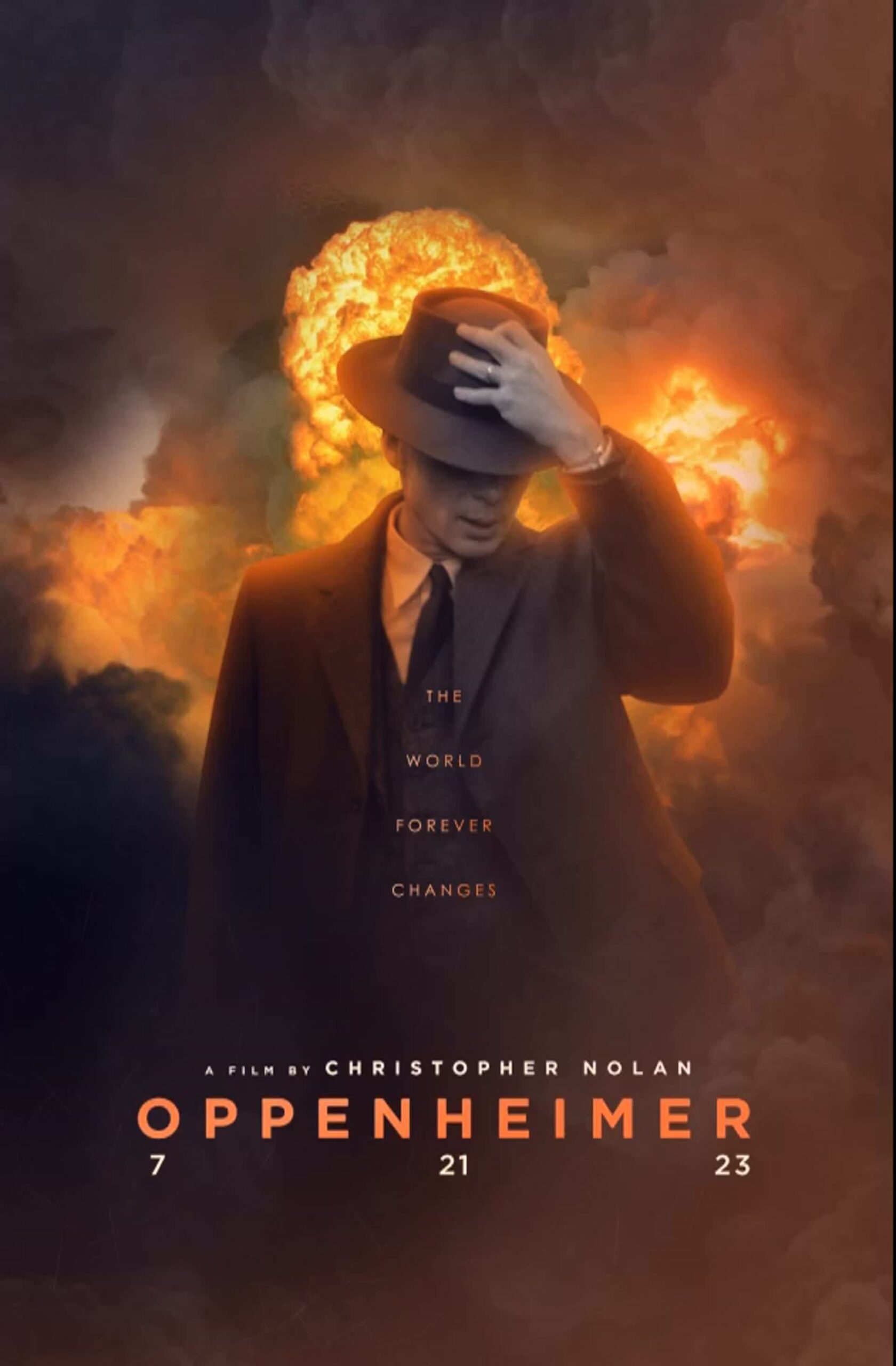Oppenheimer
Oppenheimer *, 2023, 3 stars
Nolan’s near miss
Oppenheimer is powerful but flawed
 Exclusive to MeierMovies, July 21, 2023
Exclusive to MeierMovies, July 21, 2023
“Go big or go home,” the filmmaking of Christopher Nolan screams. From Dunkirk to Interstellar to Inception to Tenet to his Batman movies, Nolan proffers big ideas, big scope, big sound and big film stock (70 mm IMAX).
J. Robert Oppenheimer offered the same to the United States military in World War II, just with a different conjunction: “Go big AND go home.” In other words, he gave America the biggest weapon the world had ever seen, allowing our troops to return stateside.
So you’d think the two would be a perfect match. Well, it turns out there is such a thing as too big. For while the master craftsman has engineered a compelling and occasionally powerful production, Oppenheimer is also unnecessarily frenetic, unfocused, loud, overscored and just plain confusing. It’s impossible to fully resist its vigor and panache, but after being bombarded with trailer-type pacing and sound for three hours, this critic was relieved when the 70mm projector flickered dark.
That’s not to say that said projector doesn’t display moments of profound beauty, not just in the film print’s color, clarity and light, but also in the movie itself, which takes us from the early career of Oppenheimer, through World War II, to Oppenheimer’s post-war career and controversies. And several performances are memorable, particularly Cillian Murphy in the title role and Matt Damon as the top military official on the Manhattan Project. Florence Pugh, as Oppenheimer’s one-time girlfriend and subsequent mistress, is quite good, and quite naked. Emily Blunt, as his wife, can’t rely on the scene-stealing technique of getting nude, but she still does reasonably well with the limited action the screenplay gives her. Most of the other members of the stellar ensemble (Casey Affleck, Rami Malek, Josh Harnett, Alden Ehrenreich and Kenneth Branagh, to name a few) get a bit lost, though. (Not lost is Robert Downey Jr., but more on him later.) And cinematographer Hoyte van Hoytema (perhaps the best in the business not named Roger Deakins) deserves praise, as does the practical-effects crew.
Oppenheimer is at its best when it’s one part contemplative (as when a conflicted title character confronts the bomb’s moral complexities), one part surreal (particularly in a scene of haunting montage) and one part quiet (which is almost never). But it struggles as a bio-pic. Indeed, it’s not really a bio-pic at all. Instead, it’s a drama-thriller that, in typical Nolan style, jumps around in time and place. That approach has worked well for the director in the past, particularly with Dunkirk, but it’s exhausting here, especially when it’s focusing on Lewis Strauss (Downey), the former chairman of the U.S. Atomic Energy Commission.
Shockingly, Nolan spends more time on Strauss than on the science behind the bomb. That might have worked well in the 2005 biography American Prometheus (by Kai Bird and Martin Sherwin), upon which Nolan based his screenplay, but it almost ruins the film. Simply put, Nolan takes his eye off the ball, or, more precisely, the bomb. Maybe he should have heeded the words of President Truman, who, in a badly misrepresented cameo, reminds Oppenheimer that the Japanese don’t care who made the bomb, only who dropped it.
Transpose that sentiment to the film, and one is reminded that however interesting the story of Oppenheimer (and however uninteresting the story of Strauss), the bombs (Trinity, Little Boy and Fat Man) will always be the main characters in this tale. And despite Nolan’s best intentions, relegating the bombs to supporting roles is tantamount to James Cameron spending most of his time on events prior to and after Titanic’s maiden voyage while giving short shrift to the ship. That decision doesn’t sink Oppenheimer, but it’s an iceberg just off the starboard bow.
© 2023 MeierMovies, LLC
For more information about this movie, visit IMDB and Wikipedia.